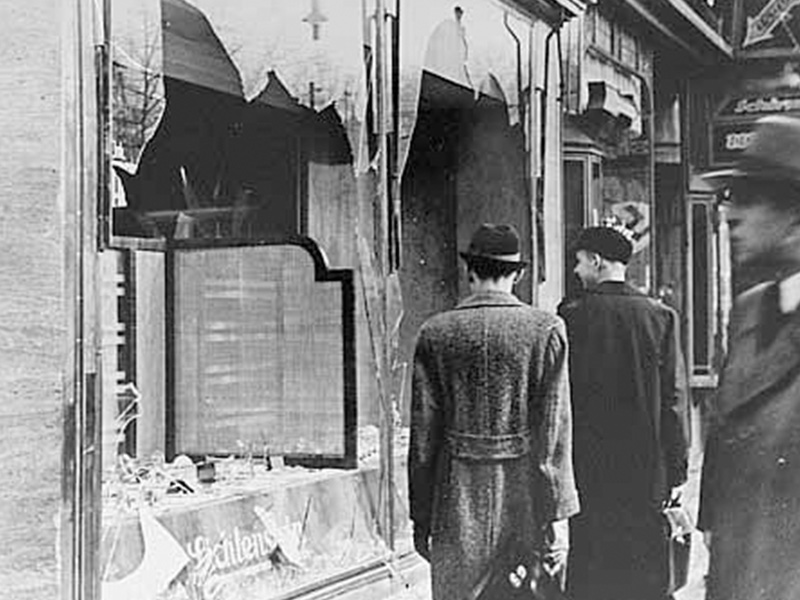When Reformation leader Martin Luther nailed his 95 theses to the church door in Wittenberg, Germany, in 1517, he set off a chain of events that would lead to a great schism in Western Christianity.
But perhaps an even greater legacy, some argue, is that Luther’s teachings, which in a matter of years became the dominant religion in Germany, would culminate in the Holocaust over 400 years later.
Luther was ordained a Catholic priest in Germany in 1507, but began to question several of the church’s teachings, primarily the selling of indulgences and its insistence on good deeds as the path to salvation.
This era was also the dawn of the printing press, and Luther began vociferously publishing his thoughts, sermons, essays and books. Among his most infamous was On the Babylonian Captivity of the Church, a violent attack on Catholicism and the pope. He was excommunicated from the church in 1521, which branded him a pariah and absolved anyone who killed him.
But Luther had a benefactor in Prince Frederick III of Saxony, who hid him in his castle in Wartburg. Following the Peasants War (1524-25), a sort-of-peace allowed Luther to leave his sanctuary and return to Wittenberg, where he continued to preach and publish.
One notorious work, written in 1543, was the 65,000-word On Jews and their Lies. This wasn’t his first anti-Jewish tirade, but it certainly was his most vitriolic.
In his early years, he took a softer stance towards the Jews. Luther believed that once Christianity was reformed, God would seek to convert the Jews.
In 1523, Luther, writing in That Jesus Christ was Born a Jew, urged Christians to treat Jews with kindness and respect. “We must receive them cordially, and permit them to trade and work with us, that they may have occasion and opportunity to
associate with us, hear our Christian teaching and witness our Christian life.”
But when Luther realized that the Jews weren’t converting, his tone shifted drastically. In On Jews and Their Lies, Luther made seven points, among them: that their synagogues, books and schools be burned, their houses razed, the rabbis forbidden to preach “on pain of loss of life or limb” and that Jews should be enslaved, expelled or even killed. “We are at fault in not slaying them,” he wrote.
By the time Luther died in 1546, Lutheranism was the dominant religion in Germany and would continue to be for centuries. His ideas permeated throughout all aspects of society; not just religion, but also matrimony, morality and family life. His translation of the Bible into German had a strong influence on shaping the modern language. His catechisms are still taught in German schools, and even recently, in 2003, a German poll named Luther the second best German ever, second only to the respected Konrad Adenauer, the first chancellor of West Germany, and ahead of Albert Einstein and Johann Sebastian Bach.
In Nazi Germany, most anti-Jewish books were sprinkled with quotes from Luther, and British historian Diarmaid MacCulloch says that On Jews and Their Lies – which was displayed prominently at the Nuremberg rallies – was a blueprint for Kristallnacht. Nuremberg’s mayor handed Juliuss Streicher, editor of the racist Der Sturmer, a copy of the tract and the Holocaust’s architect, Heinrich Himmler, was known to speak fondly of Luther.
During the Peasants War, when, inspired by the Reformation, German peasants took up arms against the nobility, Luther took the side of the authorities, perhaps because of Frederick III’s protection. Despite his rebellion against the church, Luther always disavowed rebellion against secular authority. Author Michael Massing argues in Fatal Discord that reflecting this longstanding tradition of deference to the state, the majority of German Protestants did not resist Hitler’s murderous attacks on the Jews.
Scholars and historians remain divided about how much Luther influenced the Holocaust. To suggest that Luther was the only cause of the Shoah would grossly underestimate the history of anti-Semitism in Europe, but there can be little doubt that Luther’s teachings continued to have a strong influence on German society well into the 20th century.
